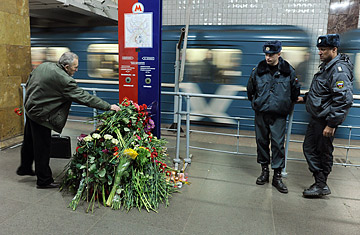
Russian police watch as a man pays his respects to the victims of the recent terrorist bombing in the Moscow metro station.
In the Russian region of Dagestan this week, few were surprised when the sound of heavy artillery and helicopter gunships began to reverberate from the forests around the city of Gubden. The husband of one of the suicide bombers who blew herself up on the Moscow subway on March 29 had been hiding out in the area, and the security forces were bound to come looking for him and his cohorts. The hunt began on April 11, turning several square miles of forest into a war zone on Russia's southern flank. Now it seems clear that the more measured approach to fighting the insurgency in Russia, which had promised to bring development instead of more fighting to impoverished Dagestan, has been put aside.
Crackdowns, say many experts, usually serve to radicalize the local population, further stimulating the flow of money and new recruits to terrorist groups. But the popular calls for revenge after the subway bombings left the government with few other choices. Even the champion of a softer approach, President Dmitri Medvedev, pledged to get "more cruel" against the terrorists on April 1. On Tuesday, the state-run polling agency VTsIOM reported that 75% of Russians say they believe terrorism can only be defeated by force, up from 70% in 2002. There are no public debates in Russia about how to treat terror suspects, nothing like the American soul-searching on detainees in Guantanamo Bay. Officials have openly announced that civil rights will be null and void in the "zones of operation," including the freedom of movement and information.
The people of the North Caucasus are well-accustomed to Moscow's iron fist. They have been at the center of Russia's Islamist insurgency for decades, and the return of massive "counter-terrorist operations" seems to be treated like a storm that hadn't passed in a while. "People here are mostly calm. They're used to it. They're staying inside," says Yulya Yuzik, an author who is researching her book, Brides of Allah, in the regional capital of Dagestan. "Around those forests you can hear the blasts from up in the mountains. But it sounds like it might pass tomorrow. Or maybe it will continue through the next day, too," she told TIME by phone.
On Tuesday, the chairman of the National Anti-Terrorism Committee, Alexander Bortnikov, read out the list of his group's successes so far. He claimed the organizers of the November bombing of a train from Moscow to St. Petersburg that killed 29 people had been found in the North Caucasus and 26 of them had been "destroyed." "The security measures taken by the government will be intensified to include preventative and harsh responses to the terrorists. The bandits must know that anyone who is involved in the organization of terror attacks, and even those who give them material support, will get the punishment they deserve," said Bortnikov, who is also the head of the FSB, the successor agency to the Soviet KGB.
He did not list how many of the organizers of the subway bombings had been killed, but said the perpetrators had been identified and were being pursued. Those investigations have focused on the brother and husband of Maryam Sharipova, the 28-year-old computer science teacher who allegedly blew herself up in the subway just beneath Lubyanka Square, the home of Bortnikov's FSB. The hunt for the man said to be her husband and his associates has been used to justify this week's crackdown in Dagestan. But Sharipova's father, Rasul Magomedov, told The Associated Press on April 6 that his daughter was not even married, and had always lived with her parents in the village of Balakhani. "It's absolute nonsense," he said. "She was always at school or at home. If there is a husband, his wife should be with him."
Whatever the true connection between the subway bombings and the battle unfolding in the mountains of Dagestan, experts say Russia's war on terror has entered a brutal phase. "Now the heads of security forces have the green light to act with maximum harshness, including against the families of the terrorists," says Pavel Baev, an expert on the North Caucasus for the International Peace Research Institute in Oslo. It is a dramatic policy reversal. Just last year, Moscow was trying to create jobs and opportunities for young people while seeking to uproot the deep hatred many locals have for the police and federal government. Medvedev was the main advocate of this approach, but, says Baev, "he was not prepared for these kinds of terror attacks, and they seem to have changed his perspective. Whereas before he was highlighting the fact that he was a former lawyer and standing up for civil rights, now he hasn't mentioned once that they will put the terrorists on trial. He is simply announcing that we are annihilating them."
Alexander Cherkasov, a board member of Russia's main human rights organization, Memorial, agrees that Russia appears to be returning to a harshness similar to the time of the war in Chechnya. "We're seeing a shift away from things like mass arrests and harsh interrogations toward the tactic of simply eliminating terror suspects," he says before turning sardonic. "Yes, of course this implies human rights violations. But human rights have been sort of a moot point in these regions for some time, and they will continue to be."
